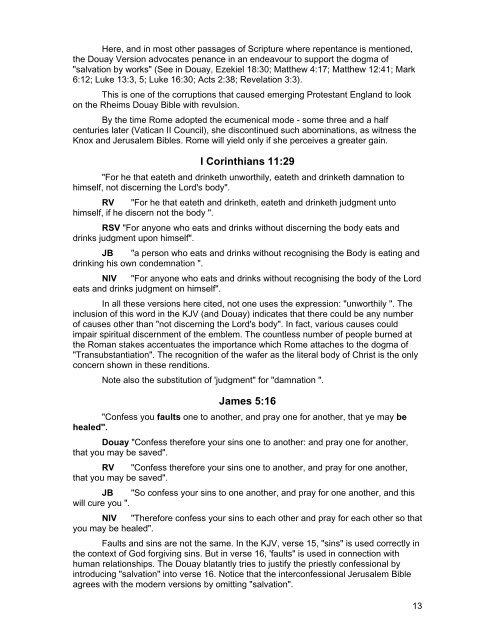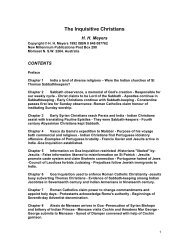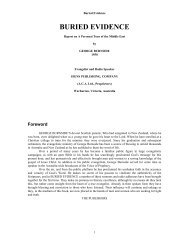Battle of the Bibles - Present Truth
Battle of the Bibles - Present Truth
Battle of the Bibles - Present Truth
Create successful ePaper yourself
Turn your PDF publications into a flip-book with our unique Google optimized e-Paper software.
Here, and in most o<strong>the</strong>r passages <strong>of</strong> Scripture where repentance is mentioned,<br />
<strong>the</strong> Douay Version advocates penance in an endeavour to support <strong>the</strong> dogma <strong>of</strong><br />
"salvation by works" (See in Douay, Ezekiel 18:30; Mat<strong>the</strong>w 4:17; Mat<strong>the</strong>w 12:41; Mark<br />
6:12; Luke 13:3, 5; Luke 16:30; Acts 2:38; Revelation 3:3).<br />
This is one <strong>of</strong> <strong>the</strong> corruptions that caused emerging Protestant England to look<br />
on <strong>the</strong> Rheims Douay Bible with revulsion.<br />
By <strong>the</strong> time Rome adopted <strong>the</strong> ecumenical mode - some three and a half<br />
centuries later (Vatican II Council), she discontinued such abominations, as witness <strong>the</strong><br />
Knox and Jerusalem <strong>Bibles</strong>. Rome will yield only if she perceives a greater gain.<br />
I Corinthians 11:29<br />
"For he that eateth and drinketh unworthily, eateth and drinketh damnation to<br />
himself, not discerning <strong>the</strong> Lord's body".<br />
RV "For he that eateth and drinketh, eateth and drinketh judgment unto<br />
himself, if he discern not <strong>the</strong> body ".<br />
RSV "For anyone who eats and drinks without discerning <strong>the</strong> body eats and<br />
drinks judgment upon himself".<br />
JB "a person who eats and drinks without recognising <strong>the</strong> Body is eating and<br />
drinking his own condemnation ".<br />
NIV "For anyone who eats and drinks without recognising <strong>the</strong> body <strong>of</strong> <strong>the</strong> Lord<br />
eats and drinks judgment on himself".<br />
In all <strong>the</strong>se versions here cited, not one uses <strong>the</strong> expression: "unworthily ". The<br />
inclusion <strong>of</strong> this word in <strong>the</strong> KJV (and Douay) indicates that <strong>the</strong>re could be any number<br />
<strong>of</strong> causes o<strong>the</strong>r than "not discerning <strong>the</strong> Lord's body". In fact, various causes could<br />
impair spiritual discernment <strong>of</strong> <strong>the</strong> emblem. The countless number <strong>of</strong> people burned at<br />
<strong>the</strong> Roman stakes accentuates <strong>the</strong> importance which Rome attaches to <strong>the</strong> dogma <strong>of</strong><br />
"Transubstantiation". The recognition <strong>of</strong> <strong>the</strong> wafer as <strong>the</strong> literal body <strong>of</strong> Christ is <strong>the</strong> only<br />
concern shown in <strong>the</strong>se renditions.<br />
Note also <strong>the</strong> substitution <strong>of</strong> 'judgment" for "damnation ".<br />
James 5:16<br />
"Confess you faults one to ano<strong>the</strong>r, and pray one for ano<strong>the</strong>r, that ye may be<br />
healed".<br />
Douay "Confess <strong>the</strong>refore your sins one to ano<strong>the</strong>r: and pray one for ano<strong>the</strong>r,<br />
that you may be saved".<br />
RV "Confess <strong>the</strong>refore your sins one to ano<strong>the</strong>r, and pray for one ano<strong>the</strong>r,<br />
that you may be saved".<br />
JB "So confess your sins to one ano<strong>the</strong>r, and pray for one ano<strong>the</strong>r, and this<br />
will cure you ".<br />
NIV "Therefore confess your sins to each o<strong>the</strong>r and pray for each o<strong>the</strong>r so that<br />
you may be healed".<br />
Faults and sins are not <strong>the</strong> same. In <strong>the</strong> KJV, verse 15, "sins" is used correctly in<br />
<strong>the</strong> context <strong>of</strong> God forgiving sins. But in verse 16, 'faults" is used in connection with<br />
human relationships. The Douay blatantly tries to justify <strong>the</strong> priestly confessional by<br />
introducing "salvation" into verse 16. Notice that <strong>the</strong> interconfessional Jerusalem Bible<br />
agrees with <strong>the</strong> modern versions by omitting "salvation".<br />
13





